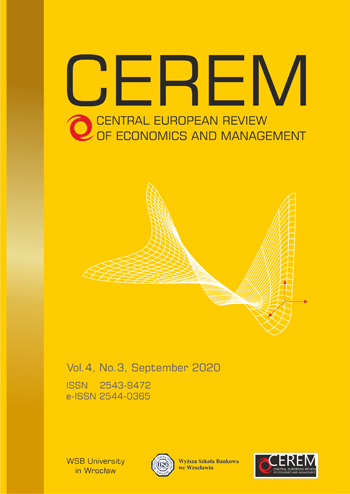The Legacy of Andries Nentjes
DOI:
https://doi.org/10.29015/cerem.889Abstrakt
Aim: The aim of this paper is to provide a brief overview of the life and work of Professor Andries Nentjes, who passed away early 2019. As one of the founding fathers of environmental economics in the Netherlands, he contributed in particular to the international literature on market-based pollution control. We wish to honour the legacy of Andries Nentjes by outlining some highlights of his impressive academic research and by showcasing his active contributions to a more sustainable society.
Bibliografia
Dijkstra B.R., Nentjes A. (2020), Pareto-efficient solutions for shared public good provision: Nash Bargaining versus Exchange-Matching-Lindahl, “Resource and Energy Economics”, vol. 61, pp. 101-179.
Koutstaal P., Nentjes A. (1995), Tradable carbon permits in Europe: Feasibility and comparison with taxes, “Journal of Common Market Studies”, vol. 33 no. 2, pp. 219-233.
Krozer Y., Nentjes A. (2006), An essay on innovations for sustainable development, “Environmental Science”, vol. 3 no. 3, pp. 163-174.
Kuipers S.K., Nentjes A. (1973), Pollution in a neo-classical world: The classics rehabilitated?, “De Economist”, vol. 121, pp. 52–67.
Nentjes A. (2017), Vijftig jaar milieueconomie, “Nieuwsbrief Milieu en Economie”, 13 oktober 2017.
Nentjes A. (1990), An economic model of transfrontier pollution abatement’, in: Public finance, trade and development, ed. V. Tanzi (ed.), Wayne State University Press, Detroit MI, USA.
Nentjes A. (1977), Van Keynes tot Keynes: De ontwikkeling van het denken over geld en werkloosheid bij Keynes, Dissertation, University of Groningen.
Oosterhuis F. (2018), In memoriam Andries Nentjes, “Nieuwsbrief Milieu en Economie”, 23 april 2018.
Woerdman, E., Nentjes A. (2019), Emissions trading hybrids: The case of the EU ETS, “Review of Law and Economics”, vol. 15 no. 1, pp. 1-32.
Pobrania
Opublikowane
Numer
Dział
Licencja
Autor przenosi nieodpłatnie na Wyższą Szkołę Bankową we Wrocławiu , bez ograniczeń terytorialnych, majątkowe prawa autorskie do tego utworu w rozumieniu ustawy z dnia 4 lutego 1994 roku o prawie autorskim i prawach pokrewnych ( Dz.U. 1994, Nr 24, poz. 83 ze zm. )na zasadzie wyłączności, tj. prawo do:
a) wyłącznego używania i wykorzystania utworu w dowolnej działalności przez Wyższą Szkołę Bankową we Wrocławiu, w szczególności w działalność Biblioteki Cyfrowej uruchomionej przez Wyższą Szkołę Bankową we Wrocławiu
b) wytwarzania, utrwalania i zwielokrotniania egzemplarzy utworów wszelkimi technikami, w tym techniką drukarską, reprograficzną, zapisu magnetycznego oraz techniką cyfrową, w szczególności ich zwielokrotniania poprzez dokonywanie zapisów na płytach typu CD,
c) zamieszczenia wybranych fragmentów utworu w celach promocyjnych w publikacjach, materiałach promocyjnych, w sieci Internet oraz sieciach wewnętrznych typu Intranet Wyższej Szkoły Bankowej we Wrocławiu,
d) wprowadzania utworu do pamięci komputera Wyższej Szkoły Bankowej we Wrocławiu,
e) kopiowania i powielania utworu w technologiach fotomechanicznych lub innych znanych w dniu zawarcia umowy (fotokopie, kserokopie itp.),
f) przetworzenia dzieła na formę elektroniczną i nieograniczonego rozpowszechniania w sieci Internet.


